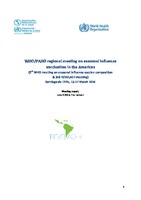WHO/PAHO regional meeting on seasonal influenza vaccination in the Americas (3rd WHO meeting on seasonal influenza vaccine composition & 3rd REVELAC-i meeting
| dc.contributor | World Health Organization | en_US |
| dc.date.accessioned | 2016 | |
| dc.date.available | 2016 | |
| dc.date.issued | 2016 | |
| dc.identifier.uri | https://iris.paho.org/handle/10665.2/31292 | |
| dc.description.abstract | [Executive Summary]. From 15-17 March 2016, the World Health Organization (WHO) and the Pan American Health Organization (WHO/Region of the Americas) held a regional meeting on influenza vaccination in Santiago, Chile. The meeting combined the Third WHO meeting on seasonal influenza vaccine composition and the Third meeting of the REVELAC-i network (Network for evaluating influenza vaccine effectiveness in Latin America and the Caribbean). It aimed to support countries of Latin America and the Caribbean (LAC) in using information from influenza surveillance and influenza vaccination programs to make evidence-based decisions and further develop the recommendations for seasonal influenza vaccination. Participants from 21 countries, two WHO Collaborating Centers for Reference and Research on Influenza (Center for Disease Prevention and Control, USA (US-CDC), and Victorian Infectious Diseases Reference Laboratory, Australia) and eight collaborating institutions/partners, and multidisciplinary teams from the ministries of health across the Americas (professionals engaged in epidemiological and virological influenza surveillance and immunization programs managers) attended the meeting. Influenza vaccination is particularly challenging compared to other vaccines included in EPI schedules, due to the need for annual, optimally timed vaccination, the wide spectrum of target groups that comprises the entire life course (over six months of age), a relatively lower vaccine effectiveness compared to childhood EPI vaccines, and the limitations of the availability of vaccines. In recent years, the LAC countries have continued their efforts to sustain or increase seasonal influenza vaccine uptake among high risk groups, especially among pregnant women. These countries have also continued strengthening influenza surveillance, immunization platforms and information systems, indirectly improving preparedness for future pandemics. Challenges, however, persist in the estimation of vaccination coverage, especially for pregnant women and persons with chronic conditions. Since 2013, LAC countries through their influenza vaccine effectiveness evaluation network (REVELAC-i for its acronym in Spanis Red para la Evaluación de Vacunas En Latino América y el Caribe–influenza) have successfully estimated influenza vaccine effectiveness against severe influenza illness among children aged 6 months-5 years and adults ≥60 years targeted for vaccination. Regarding influenza seasonality in countries of the American Tropics, the analysis of recent epidemiological evidence suggested no evidence of year round circulation (except in Colombia and Venezuela) but rather the occurrence of one to two annual epidemic peaks of influenza illnesses and most of them (except Mexico, Jamaica and Guatemala) corresponding to southern hemisphere circulation. WHO/PAHO emphasized the importance of continuing intensive/mass vaccination before the primary influenza epidemic peak, reaching high vaccination coverages among high risk groups. Any adjustments to national influenza vaccination guidelines should be guided by the local epidemiology of influenza, as demonstrated by some countries (five from Central America and one from the Caribbean, since 2007) that changed their vaccination timing to April-May using the Southern Hemisphere formulation. Considerations for a prolonged supply of influenza vaccines in tropical countries were also discussed during the meeting following an update from global and regional influenza vaccine manufacturers. The meeting participants agreed on a short term research agenda addressing influenza vaccine effectiveness and impact among all target groups, knowledge, attitudes and practices related to vaccination among pregnant women and healthcare workers, documenting the experience of influenza vaccination as recommended by the SAGE and exploring the cost-effectiveness of quadrivalent influenza vaccines for which there is no official WHO nor PAHO TAG recommendation to date. | en_US |
| dc.language.iso | en | es_ES |
| dc.publisher | PAHO | es_ES |
| dc.subject | Vaccination | es_ES |
| dc.subject | Influenza Vaccines | es_ES |
| dc.subject | World Health Organization | en_US |
| dc.subject | Americas | es_ES |
| dc.subject | Emergencies | es_ES |
| dc.subject | Preparedness | es_ES |
| dc.subject | Pandemics | es_ES |
| dc.title | WHO/PAHO regional meeting on seasonal influenza vaccination in the Americas (3rd WHO meeting on seasonal influenza vaccine composition & 3rd REVELAC-i meeting | en_US |
| dc.type | Meeting reports | es_ES |
| dc.rights.holder | Pan American Health Organization | en_US |
| dc.contributor.corporatename | Pan American Health Organization | en_US |
| paho.publisher.city | Geneva | es_ES |
| paho.source.centercode | US1.1 | es_ES |
| paho.subject | Cat 1. Communicable Diseases | es_ES |
| paho.subject | Cat 5. Preparedness, Surveillance, and Response | en_US |




